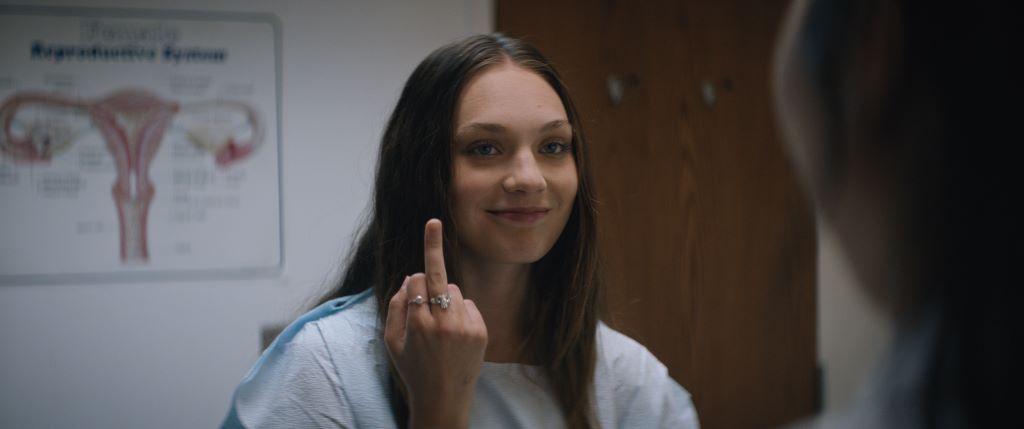Reviews include Deadpool & Wolverine, Doubles, and Mountain Queen: The Summits of Lhakpa Sherpa.
TFCA Friday: Week of Feb. 2
February 2, 2024

Welcome to TFCA Friday, a weekly round-up of film reviews and articles by TFCA members.
In Release this Week
Argylle (dir. Matthew Vaughn)
“While it superficially walks in the footsteps of Austin Power‘s spoofy satire, there is no unifying creative vision or visible passion behind it. Other than Rockwell, every character’s writing and delivery is painfully shallow — and it becomes especially egregious with Howard,” notes Jackson Weaver at CBC. “In Argylle, Conway is played just as straight, and just as clichéd, as the rest of her characters. So instead of coming across as a genre love-letter, the movie reeks of a kind of focus-grouped, soulless Frankenstein-product strategy. It’s the sort of flick that, of all the possible choices, would of course pick the AI Beatles song for its climactic emotional moment.”
“The entirety of the movie plays out like a bad spy novel, from the dialogue to the fight scenes to the mugging for the camera, with director Matthew Vaughn and writer Jason Fuchs (presumably) taking the piss out of the genre — and, to their credit, a lot of the stupidity of the premise is explained in a decently fun way,” notes Rachel Ho at Exclaim!. “There’s no question that Vaughn understands the genre and can create a properly entertaining spy movie. Amusingly, his actual abilities as a filmmaker inhibit his ability to make Argylle what it so desperately tries to be: an unserious romp.”
“Although the acting is fine, you don’t care about the characters—not even Bryce Dallas Howard’s Elly/Rachel, who undergoes such a total change that it’s hard to fathom what parts represent her true self,” admits Marc Glassman at Classical FM. “She’s funny and identifiable as Elly but how much of that person is in Rachel? Far more difficult to comprehend is Rockwelll’s Aiden who has to move from being a comic figure into a lover as the film progresses; even for him, it’s too difficult a journey to manage. The only one who does pull off a dual identity is O’Hara, but she isn’t in enough scenes to make that much of a difference.”
“With the overuse of plot twists and CGI aided action sequences, the film eventually turns out to be a bore,” yawns Gilbert Seah at Afro Toronto. “The film should have ended 15 minutes earlier and who really cares what happens to Alfie the cat anyway?”
“Argylle has some heavy hitters in its cast, but some of them are barely there,” observes Chris Knight at Original Cin. “Samuel L. Jackson has but one major scene, while Bryan Cranston’s one-note bad guy is a role he could play in his sleep, and John Cena is merely the personification of another of Elly’s characters…Argylle is not as dreadfully unwatchable as the Kingsman movies, but it is dolefully derivative, as if The Manchurian Candidate and The Secret Life of Walter Mitty had a baby, then abandoned it to be raised on The Planet of the Apes.”
“The screenplay, credited solely to Jason Fuchs (with the name ‘Elly Conway’ entirely absent from the onscreen credits), is a sloppy pileup of lousy twists that eventually cancel each other out to the point that the story ceases to make a single lick of sense,” writes Barry Hertz at The Globe and Mail. “And don’t be suckered in by the slivers of self-awareness…because they are only inserted as cruel jokes to the audience: ‘We know this is torture – but we’re not going to stop!’” Hertz also speaks with Matthew Vaughn about the better story: Elly’s story. “The book is doing fantastically, and hopefully the movie will do well enough so we can make more based on the other books. But there is an Elly Conway. She is not Taylor Swift, as some rumours have suggested. That was an astonishingly surreal moment in my life. The Elly Conway reveal will be happening soon,” says Vaughn. “I’m not allowed to say who it is, out of respect. Let’s put it this way: Even some of the world’s most famous authors, we don’t know who they are or what they look like. Some people don’t want attention. The Taylor Swift rumour made the noise deafening, but it wasn’t the plan to reveal anything. The publishers, they’re secretly loving it. But it’s going to happen very soon.”
“On the fly, via exposition from Rockwell’s hippie spy Aidan, we learn that Howard’s cat-loving author, Elly Conway, has unwittingly unleashed global intrigue with her best-selling novels about a suave secret agent named Argylle, played by one-time 007 candidate Henry Cavill. The body count soars as an absurd number of plot twists ensue, each undermining interest in a story that’s dedicated more to servicing franchises than to making the most of potentially interesting characters,” writes Peter Howell at Night Vision. “The film’s most unforgiveable sin is the repeated use of the new Beatles song ‘Now and Then,’ which is robbed of its poignancy amid the mirthless mayhem.”
Dario Argento Panico (dir. Simone Scafidi)
“More interesting to fans of Giallo horror and of Dario Argento, but the doc provides an informative and deeper look at both the master’s horror psyche and his work in horror cinema. It shows both talent and perseverance are involved,” observes Gilbert Seah at Afro Toronto.
Fitting In (dir. Molly McGlynn 🇨🇦)
“Fitting In is kind of on-the-nose in the way it portrays the transference of attitudes. Lindy’s initial gynecologist is an older man, who prescribes a series of sex-toys and contrivances to at least, hopefully, give her a semblance of a ‘functioning’ vagina. Her frustration is portrayed with exasperated humour by Ziegler, which accentuates the underlying ridiculousness of the treatment process and its goals,” writes Jim Slotek at Original Cin. “Describing Fitting In makes it sound like a movie that puts its message ahead of the narrative. For the most part, the opposite is true. Given the circumstances, the characters all act in unsurprising and believable ways. There’s a natural sense to the acting, and even when she lashes out or makes bad decisions, Lindy remains sympathetic and understandable.”
“The semi-autobiographical film from Canadian Molly McGlynn is a tremendous follow-up to her 2017 debut Mary Goes Round,” says Rachel Ho at Exclaim!. “McGlynn builds off the success of Mary Goes Round by telling a story close to her heart, adapting it for a new era where gender identity and fluid sexual preferences are spoken of more openly than in past generations. In the same breath, McGlynn finds the commonalities between the past, the present and the future, footing Lindy’s experience as (unfortunately) timeless.” Ho also speaks with McGlynn about drawing upon her personal experience and relationship with her mother, who died from cancer when the filmmaker was 21. “To me, a woman’s body was a bomb waiting to go off,” McGlynn tells Ho. “A lot of the film is about how a mother and daughter relate, or don’t, with each other, when their bodies are failing them in different ways. A really powerful part specifically was kind of an amends to my mother and seeing things differently with time, understanding her helplessness and her sometimes misguided attempts at connecting with me.”
“Fitting In aptly deals with a sensitive and unfamiliar topic, so for audiences unfamiliar with intersex and non-binary people, the film should serve as an eye-opener,” notes Gilbert Seah at Afro Toronto.
Orion and the Dark (dir. Sean Charmatz)
“Brought to life with a smooth and almost restrained kind of animation – all rounded edges and frames designed to breathe, rather than hyperactively cram in as much action as possible – and paced with a confident speed, Orion and the Dark will charm and entrance,” says Barry Hertz at The Globe and Mail. “Like the best kind of children’s movies, it will make adults tear up and compel children to demand, ‘Again!’ And best of all: not a Minion or Mario in sight.”
“But Charlie Kaufman being Charlie Kaufman has good ideas in his storytelling including an intriguing timeline in which Orion meets his child, his daughter, who appears in his story – sort of a childhood fantasy version of Being John Malkovich,” writes Gilbert Seah at Afro Toronto. “Not all the ideas turn to that well as expected and the film could have been funnier too, especially with all the dark entities.”
The Settlers (dir. Felipe Gálvez Haberle)
“The film marks Chile’s entry for this year’s Academy Award for Best International Feature. Despite it being a remarkable film experience, the film did not make the shortlist, unfortunately,” says Gilbert Seah at Afro Toronto. “The film won the FIPRESCI (the Critics) Award for Best Film at the 2023 Cannes Film Festival. The Settlers is unsettling but in a good way. Solid story, with solid characters in a harsh environment where anything can happen and mostly does.”
“Galvez’s film is so brilliantly shot and resolute in its construction that it becomes difficult to criticize,” notes Marc Glassman at Classical FM. “But there are flaws, mainly in the depiction of the main characters. The three men are one-dimensional, with obvious stereotypes—the British colonialist, the cowboy, the dramatically torn half-Indigenous person—never rising above their narrative construction. The film is so stark that you long for humour—even black comedy—to take place but it never does. The film has a political stance to maintain, and it does so at the expense of its artistry.”
Will (dir. Tim Mielants)
“The only complaint is that what transpires on screen in this well-worn genre has been seen one time or another in films of similar genres, though the film still manages to shock and intensify the audience, thanks to excellent production values with direction by Mielants,” says Gilbert Seah at Afro Toronto.
File Under Miscellaneous: Canadian Biz and Stories
At What She Said, Anne Brodie catches up with the Canadian box office hit Ru: “The film features a wonderfully mature performance by Chloé Djandji as young Kim and Chantal Thuy’s sensitive portrayal of Kim as an adult brings emotional richness. And new experiences of pure joy – singing around a bonfire with new Canadian friends, opening thriving businesses – allow us the luxury of relishing their successful immigration.”
At The Globe and Mail, Johanna Schneller looks at how the original Mean Girls stays fetch after 20 years and speaks with author Jennifer Keishin Armstrong about her new book on the film. “Armstrong’s most enjoyable research, she swears, was ‘talking to the Canadians in the cast. There’s something cool about the way a bunch of budding actors who knew each other, from auditions and just growing up together, made the film feel like a real high school. And they all share this weird afterlife as memes, which are so fascinating to me – how people communicate during a moment of debate or unrest or confusion by reaching for a pop culture moment.’”
At The Globe and Mail, Barry Hertz checks the streaming wars scorecard and tells why Pluto is inching up the leaderboard thanks to FAST (free ad-supported television): “When FAST was launched as a concept, there was skepticism – it was going in the opposite direction of everything else. But we started to grow the service, and we had all the measurements and accountability of streaming but with advertising – it was a marriage between the best of digital and the best of traditional linear television,” Lee Sears, Pluto’s executive vice-president, head of international advertising, and integrated marketing tells Hertz. “Because Pluto was one of the first FAST players, our expertise and scale is helping lead the conversation.”
At The Globe and Mail, Barry Hertz reports on Heritage Minister Pascale St-Onge’s announcement that the government would commit $100 million to Telefilm Canada over two years. “For producers, it was as much an issue of time as money,” writes Hertz. “Most feature films in this country shoot during the summer months, requiring approval from Telefilm before the spring in order to lock down talent, crews and locations. With executives at Telefilm unsure of how many productions they could support until now, feature films that were seeking funds have effectively been held in a state of limbo.” [But good luck finding links to a Canadian news organization’s reports on Facebook.]
At POV Magazine, Susan G. Cole profiles Alison Duke and Ngardy Conteh George of OYA Media and learns how the duo grows by raising up a new generation of Black filmmakers. “Their colleagues wondered whether, if they put so much energy towards promoting Black youth, they’d be able to keep making films of their own. Duke says she and Conteh George are giving back to their community, but the youth they assist are giving right back to them: enormous energy, creative ideas, and fresh perspectives. What effect has that had on their own new work?” writes Cole. “Duke’s eyes light up. ‘It’s getting better.’”

A Festival of Festival Coverage: The Sundance Kids (Cont’d)
At POV Magazine, Kelly Boutsalis speaks with Winding Path director Alexandra Lazarovich about bringing a positive representation of Wind River reservation to the screen and how imagineNATIVE’s Pathways and Protocols documentary helped guide the production: “When Lazarowich was approached to co-direct, she was striking as a union member of the Writers Guild of America and available for documentary directing…‘As someone who works cross border, I find a lot of American production companies don’t know about that document, so introducing them is the first thing I do with non-Indigenous productions,’ she says. ‘Then I have another conversation with them about how those things could be applicable to the project that they want me to come work on it.’ The Winding Path team were receptive to her recommendations, and already had co-producer Charine Pilar Gonzales on-board, who is Tewa from San Ildefonso Pueblo and Santa Fe. Lazarowich continued to Indigenize the production by bringing on Choctaw composer Samantha Crain.”
At POV Magazine, Pat Mullen reports on the documentary slate at Sundance and says that 2024 looks to be a good year for docs. Favourites on his list include Never Look Away, Desire Lines, Daughters, and standing tallest, Skywalkers: A Love Story. “Skywalkers invites comparison to Man on Wire with a dash of Fire of Love for its thrilling storytelling at such great heights, but thanks to contemporary technology, the film lets audiences accompany the thrill-seekers along every step of the way,” writes Mullen. “All the footage of the risky shoots comes thanks to Nikolau and Beerkus, who navigate the logistics of their photography throughout the film, including using drone shots to afford the awesome sense of scale. On the ground, Zimbalist and his crew nab equally riveting drama as the fatalist nature of skywalking divides the couple. This film in no way endorses the duo’s risky behaviour, as many of Nikolau’s friends plunge to their deaths over the course of production and the reality of the risk both rattles and fuels her. Similarly, Skywalkers features edge-of-your-seat viewing as the photographers ascend rickety buildings nimbly but perilously. The film takes audiences to heights one might never see, nor wish to experience, in real life.”
At POV Magazine, Jason Gorber offers a long conversation with Sugarcane filmmakers Julian Brave NoiseCat and Emily Kassie, whose probing of crimes committed at a B.C. residential school won the directing prize. “This is a history that even the people who survived it do not often talk about. My grandmother really doesn’t speak about her experience in residential schools beyond two stories,” says Julian Brave NoiseCat. “There’s one story about how she was hidden by her grandparents in a trapping cabin so that she would avoid being taken away to the school [but] she was still found and taken away. The other story is about how she and her friends at the school would call the priests and nuns the kenkéknem, which means black bear in our language [Secwépemc]. They would call them that because the black bear is a predator. So there is very limited conversation about this even within my own family, my own community.”
TV Talk/Series Stuff
At Exclaim!, Rachel Ho weighs in on the Mr. and Mrs. Smith remake starring Donald Glover and Francesca Sloane: “In an industry filled with unnecessary remakes and reboots, Glover and Sloane accomplish what so many have failed to do: find what was missing in the original and use that gap to drive something new. The matter-of-fact humour laced around well-choreographed action scenes already creates a highly entertaining show — but, by giving room for the emotional thrust of a couple trying to make it work, this iteration of Mr. & Mrs. Smith lends an intelligence (emotional and otherwise) the 2005 film never offered.”
At What She Said, Anne Brodie also checks out Mr. and Mrs. Smith and finds good reason to exclaim: “Boom! With explosive situations, weapons, gadgets and gizmos at the ready, they dive in and find themselves playing weird sex games with John Turturro’s billionaire. But sparks between them are flying! Secretive neighbour (Paul Dano) spies on them, and the occasional body they dump in the composter. And so off on dangerous intelligence adventures in exotic global locations. Fearless, fun, dangerous and kinda sexy,” writes Brodie. Meanwhile, Brodie finds a new woman on the force to admire in Allegiance: “The unit is investigating crimes leading to a violent far-right extremist and white supremacist subculture. This and other timely issues, including a “compassionate” hard drug-dealing grandmother, find Allegiance on the edge, reflecting troubling aspects of Canadian society as it stands,” writes Brodie. “Highly capable and smart female police officers and detectives have been the bedrock of TV since at least the early 70s’. From Angie Dickinson in Police Woman, Tyne Daley and Sharon Gless in Cagney and Lacey, to Canada’s Stana Katic in Castle, the iconic brilliant officers played by Jodie Foster in The Silence of the Lamb and True Detective: Night Country.” In a different wing, Three Little Birds is the story of sisters moving from Jamaica to Britain: “During their struggles and triumphs they retain an optimistic worldview, their fluttering newness and sweet, sensitive natures.” Heartbreak, finally, is the antidote for Valentine’s Day: “Tune in to find out why the loss hurts the way it does.”
At Original Cin, Liam Lacey checks out the new Malcolm X and Martin Luther King, Jr. mini-series Genius: “The series can’t entirely escape the pitfalls of biopic genre, including the tendency for chunks of exposition to substitute for anything resembling credible dialogue; it’s a show short on small talk. As well, as the series progresses, the repeated back-and-forth structure can feel more mechanical than illuminating,” writes Lacey. “What works are the empathetic performances, portraying real, warm characters, living real lives lived in extreme precarious conditions. Both Kelvin Harrison Jr. and Aaron Pierre…excel, managing to go beyond the familiar physicality of their characters.”



